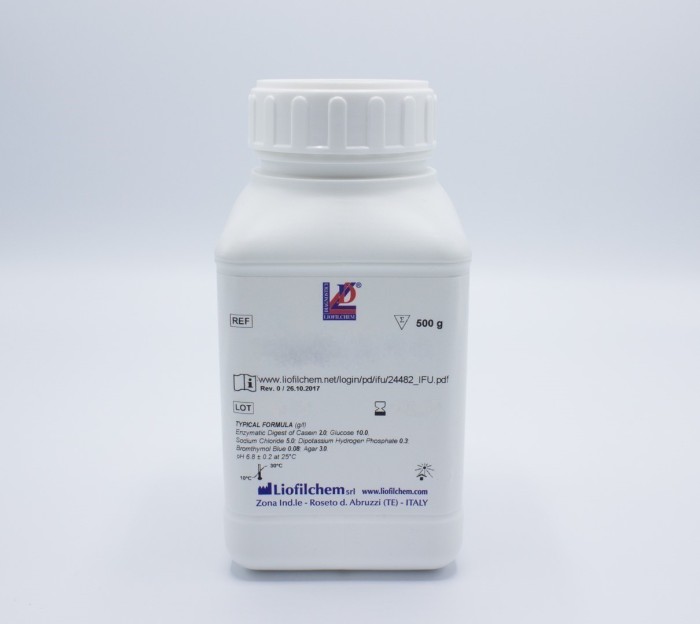Specifications:
| Application | Microbiology | ||
| Storage Temperature | Ambient | ||
| Product Type | Culture Medium | Forms | Powder |
| Product Brand | Liofilchem | ||
| Product Grade | Microbiology grade | ||
A universal microbiological medium for enumerating total viable bacteria in food, animal feed, water, and other materials. PCA is essential for quality control in food safety, water testing, and environmental microbiology. It complies with the standards set by ISO 4833 and American Public Health Association (APHA).
Product Features and Benefits
- Versatility:
- Designed for diverse applications, including food, feed, water, and environmental testing.
- Known alternately as Tryptone Glucose Yeast Agar or Casein-Peptone Dextrose Yeast Agar.
- Compliance:
- Meets specifications of ISO 4833 for food and feedstuff testing.
- Adheres to APHA standards for the examination of water, wastewater, and dairy products.
- Reliable Enumeration:
- Provides an accurate count of aerobic mesophilic microorganisms via colony-forming units (CFU).
- Suitable for pour plating, spread plating, and membrane filtration techniques.
Composition
The medium's formulation ensures robust microbial growth while preventing interference from environmental factors.
| Ingredient | Quantity (g/L) | Purpose |
|---|---|---|
| Enzymatic Digest of Casein | 5.0 | Provides nitrogen, carbon, amino acids, vitamins, and minerals essential for microbial growth. |
| Yeast Extract | 2.5 | Supplies B-complex vitamins for optimal growth. |
| Glucose | 1.0 | Acts as a readily available carbohydrate source for fermentation. |
| Agar | 15.0 | Serves as the solidifying agent for plate preparation. |
Final pH: 7.0 ± 0.2 at 25°C ensures neutral conditions suitable for most bacterial species.
Preparation Instructions
Dehydrated Medium
- Weigh 23.5 g of the powder and suspend it in 1 liter of distilled or deionized water.
- Stir the mixture thoroughly and heat to boiling while shaking frequently to ensure full dissolution.
- Sterilize the solution in an autoclave at 121°C for 15 minutes.
- If testing dairy products, ISO 4833 recommends adding 1 g of skimmed milk powder per liter for enhanced microbial growth support.
Medium in Tubes/Bottles
- Melt the contents in a water bath at 100°C (loosen caps for ventilation).
- Ensure homogeneity by inverting the container.
- Cool the medium to 45-50°C, mix gently to avoid bubbles, and pour into Petri dishes.
Test Procedure
- Sample Preparation:
- Perform serial dilutions of the test sample to ensure colony counts between 15 and 300 per plate.
- Use an appropriate diluent such as Buffered Peptone Water (ref. 24099) or Maximum Recovery Broth (ref. 20071).
- Inoculation:
- Inoculate by:
- Pour plating: Add the sample to the plate and overlay with molten agar.
- Spread plating: Spread a small sample evenly across the surface of the agar plate.
- Membrane filtration: Filter the sample and place the membrane on the agar surface.
- Inoculate by:
- Incubation:
- Incubate the plates aerobically at 30 ± 1°C for 72 ± 3 hours.
- Result Interpretation:
- Count colonies on plates with 15-300 colonies.
- Calculate the total CFU per ml or g of the sample, accounting for the dilution factor.
Quality Control
- QC Strains and Expected Results:
Microorganism ATCC Number Growth Bacillus subtilis WDCM 00003 Good Enterococcus faecalis WDCM 00009 Good Escherichia coli WDCM 00012 Good Staphylococcus aureus WDCM 00034 Good Pseudomonas aeruginosa WDCM 00024 Good - Conditions for Testing:
- Inoculum size: 50-100 CFU.
- Incubation: Aerobic, 30 ± 1°C for 72 ± 3 hours.
Physical Characteristics
- Dehydrated Medium:
- Appearance: Free-flowing, homogeneous powder.
- Color: Light beige.
- Prepared Medium:
- Appearance: Slightly opalescent.
- Color: Light amber.
Storage and Stability
- Dehydrated Medium:
- Store at 10-30°C in a dry environment.
- Ensure the container is tightly sealed to prevent moisture absorption.
- Prepared Medium:
- Store at 10-25°C away from light.
- Avoid using plates or media past their expiry date or if contamination or deterioration is visible.
- Shelf Life:
- Dehydrated Medium: 4 years.
- Prepared Plates: 6 months.
- Tubes/Bottles: 2 years.
Warnings and Precautions
- Non-Hazardous: The medium does not contain hazardous substances but should be handled by trained personnel.
- Proper Disposal: Waste must be disposed of according to national and local regulations.
- Professional Use Only: Intended exclusively for laboratory professionals with microbiological expertise.
Applications and Use Cases
- Food Safety:
- Determine bacterial contamination in dairy products, meat, and beverages.
- Water Quality Testing:
- Assess total bacterial counts in potable and environmental water.
- Animal Feed:
- Verify microbial safety in livestock feed.
- Pharmaceuticals:
- Detect microbial contaminants in pharmaceutical ingredients.
- Industrial Microbiology:
- Regular monitoring in manufacturing facilities for hygiene compliance.
Product Variants
- Dehydrated Medium:
- 100 g (ref. 620040), 500 g (ref. 610040), 5 kg (ref. 6100405).
- Ready-to-Use Plates:
- 90 mm plates (20 pcs or 100 pcs), 140 mm plates, 55 mm RODAC plates.
- Medium in Bottles:
- Volumes from 100 ml to 500 ml.
- Medium in Tubes:
- Available in 9 ml to 22 ml volumes.
References and Standards
- EN ISO 11133:2014: Microbiology of food, animal feed, and water—Preparation and performance testing of culture media.
- ISO 4833: Enumeration of microorganisms in food—Colony count technique.
- APHA Standards: Manuals for food, dairy, and water microbiological testing.
- Pack Size: 100g 500g 5kg




 0
0
